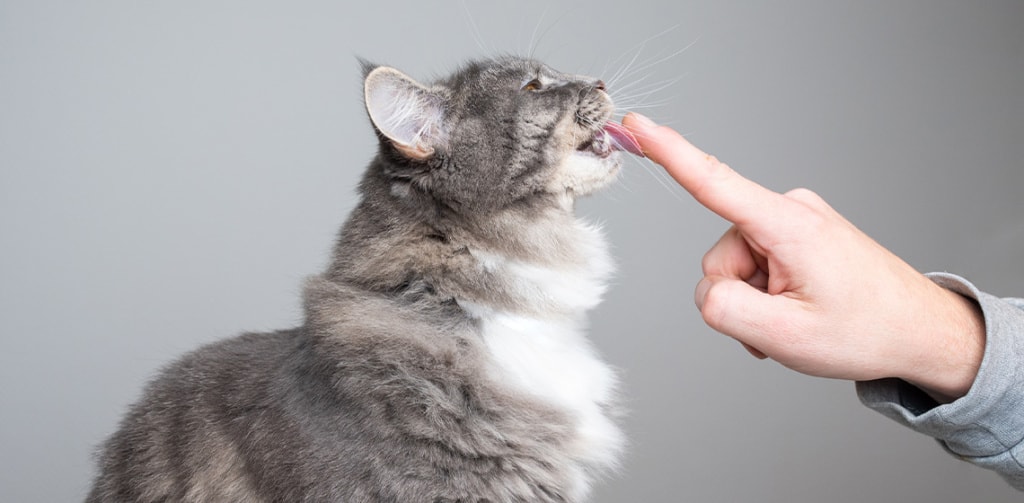Ever wondered ‘why does my cat lick me?’. Cats are well known for their fierce independence, and less well known for their loyal and loving side. Of course, most cat parents have firsthand experience of this. Nevertheless, some of their behavior can seem puzzling to us humans! Also, a cat’s lick can be surprisingly sore! So, let’s look at the reasons your cat may be licking you.
Table of Contents
Why does my cat lick me?
Your cat may be licking you for a number of reasons, but rest assured that most of them are a sign of affection! Here are some reasons your cat may be licking you:
Affection
Licking behavior starts early in life, with a mother cat licking her kittens. Cats lick their kittens to groom, to show affection and to help them pass urine and feces (by licking their back ends). So, aside from the latter of course, your cat may be showing you similar affection when they lick you.
If your cat licks you while also kneading at you with their paws, sucking and purring, this is a regression to kitten-like behavior. You could see it as the feline equivalent of a pacifier! If they’ve always done this, it’s likely they see you as a replacement for their mother and part of their family. If it’s a new behavior, it’s possible that your cat is trying to soothe themselves, due to stress or anxiety (see below for more on this).
Cats do tend to groom family members more often than unrelated cats, so usually a cat licking you is a sign of affection.
Social Bonding
Cats in groups lick each other (known as ‘allogrooming’) in order to strengthen social bonds. Some studies suggest that allogrooming is more common between cats who are related. So, when your cat licks you, they may well be treating you as part of their family.
It is thought that cats living in groups may also lick each other to create a ‘group scent’, a means of marking their territory. Alongside urine spraying, cats also use scent glands on their body and their saliva to mark their territory, by rubbing on and licking objects.
One interesting study has suggested that cats may use allogrooming to redirect potential aggression. In other words, instead of an aggressive display they groom the other cat, as a sign of status. The study found that higher ranking cats tended to groom lower ranking cats.
Anxiety
Just like any animal, cats can develop compulsive habits when they are stressed, anxious or ill. Compulsive licking is one of them. However, anxious cats will behave very differently from an affectionate cat, who is relaxed and curled up on your lap, contentedly licking you. Compulsive licking can be directed at furniture or people, but is often also directed at themselves, resulting in thinning of the fur or bald patches. In most circumstances, if your cat was licking you due to anxiety or illness, you would notice other signs or symptoms too.
If you are concerned that your cat is behaving out of character, seems anxious or unwell, then you should contact your veterinary surgery for advice.
Taste
At a simplistic level, of course some cats may simply like the way you taste! Whether this is the saltiness of your skin, or the lotion you use. Do take care if your cat does enjoy licking you, since some lotions and creams can be harmful to cats, such as corticosteroid creams or some diaper rash creams (which contain zinc).
If your cat’s licking is compulsive, a new behavior or you have any concerns about their health then it’s important to seek advice from your veterinarian.
Why does it hurt when my cat licks me??
A cat’s tongue feels a bit like sandpaper! If they lick the same spot over and over, it can start to feel a bit sore… ever wondered why? Well, cats have little spikes on their tongue, called papillae. They use these like a comb to remove dead fur and dirt during grooming. Interestingly, they also use them to cover themselves in saliva when they are too hot. The saliva then evaporates, helping to cool the cat down.
How can I stop my cat licking me?
You may not need to! If your cat licks you every now and then as a mark of affection, then there is nothing wrong with letting them. (Of course, it’s sensible to wash your hands afterwards!)
However, if you find the habit annoying, uncomfortable or the behavior is compulsive then you may want to deter your feline friend. Here are some tips on how to stop your cat from licking you:
- Consider the overall health of your cat. Is this a new behavior? Are they showing any other symptoms, or do they seem unwell in themselves? If the answer is yes to any of these, then it’s time for a veterinary checkup.
- Do you have a multicat household? Your cat may be using licking as a soothing mechanism from underlying stress. Avoiding competition for resources, such as ensuring there is one cat litter tray available per cat plus one spare, can help to reduce stress levels.
- Try distracting your cat, ideally just before they start licking you, or immediately after. Use a favorite toy or game. Enrichment toys and puzzle feeding games can be a great distraction, as well as providing mental stimulation. It’s not advisable to distract your cat with food, since this may actually train them to lick you for a treat! Too many treats are also bad for your cat’s health.
Hopefully, and most likely, your cat is licking you out of affection, and to cement that family bond. There really is nothing quite like a cat’s love! However, if your cat’s licking is compulsive, a new behavior or you have any concerns about their health then it’s important to seek advice from your veterinarian. They will be able to assess for underlying causes, and refer you to a behavior specialist if needed.
FAQ
It’s fine to let your cat lick you, but hygienically you shouldn’t let them lick your face. It’s also sensible to wash your hands afterwards.
Cats may bite after licking for a number of reasons, including wanting attention or to play. Cats often nibble their fur as part of the grooming process, so they may be mimicking this. However, they could also be doing it due to stress or pent-up aggression, since allogrooming may be used to redirect potential aggression. If your cat breaks the skin when they bite you, you should seek medical attention straight away.
When you pet your cat, your cat may see this as a form of grooming, or a sign of affection. Licking you in return may be their way of reciprocating.
It’s always tricky to attribute human emotions to animals! However, cats do tend to groom family members more often than unrelated cats, so usually a cat licking you is a sign of affection.

Sarah-Jane Molier wanted to be a veterinarian from around the age of ten. After much hard work, and her first degree in animal science, she realized this dream and graduated in 2009. She has been working in small animal clinics ever since.








